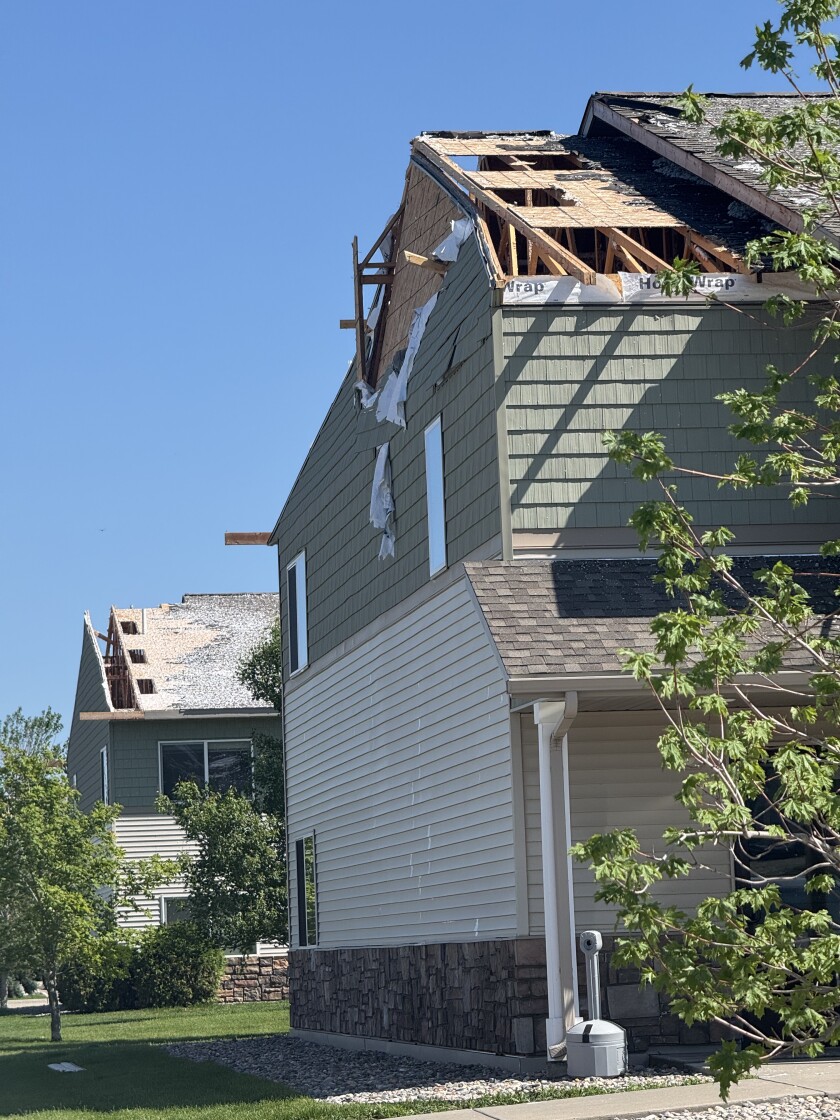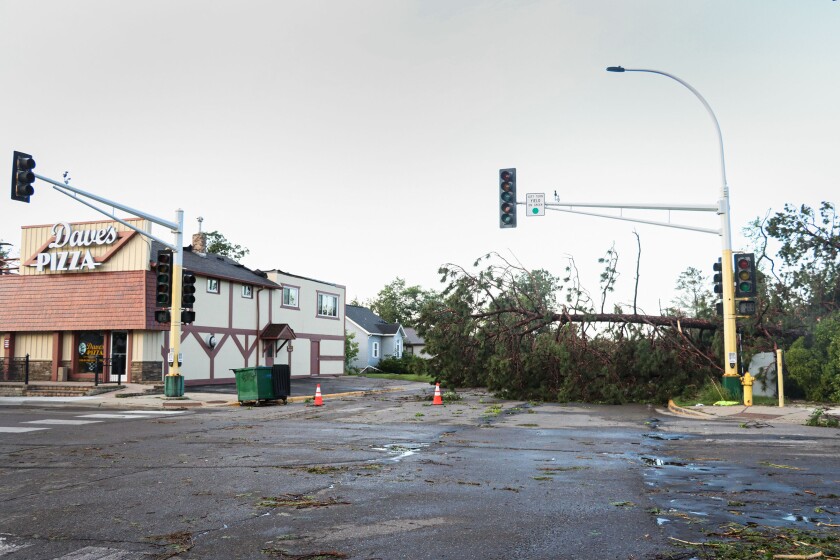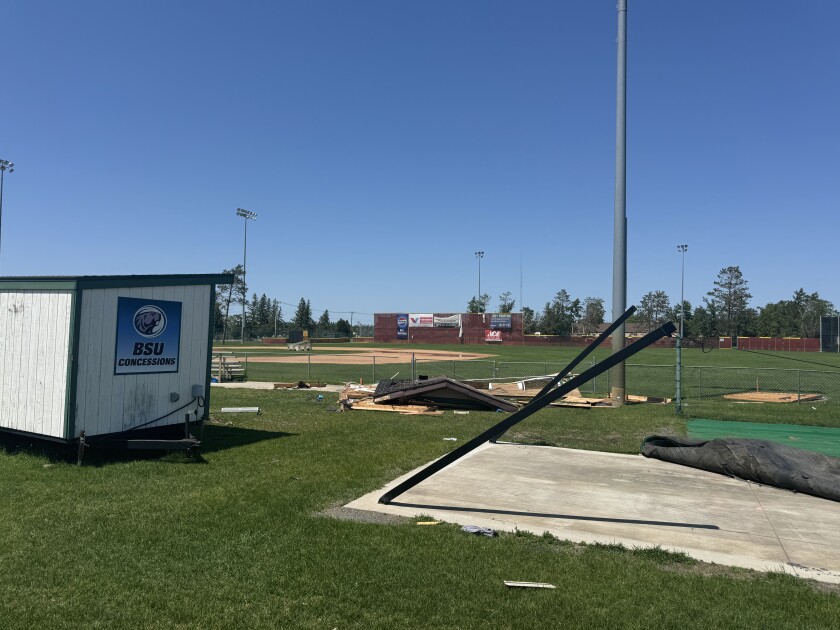BEMIDJI – Following severe storms and 100-mile-per-hour winds that caused damage throughout the city, many residents are searching for resources during a continued power outage that could last for days.
Here's a look at some updates and information from area authorities as the week progresses:
ADVERTISEMENT
Bemidji Fire Department
Curbside debris pickup began on Monday, June 23. City residents can begin bringing leaves, branches and logs to the nearest city street without impacting road surface for eventual pickup.
Residents on city water should have normal access to treated water that hasn't been impacted by the storm. Public works requests that residents ration their usage when possible to relieve pressure on the city's wastewater system. Power outages are impacting the system.
City parks are closed to the public.
Residents can haul tree debris to the to avoid waiting. The county landfill is open for extended hours from 7 a.m. to 7 p.m. through Saturday, June 28, and is located at 2331 North Plantagenet Road SE.
Beltrami County has also opened a site behind Target to allow tree debris drop-off. The site, located at 2115 23rd St. NW, will only accept tree debris; no trash is allowed.
Beware of scammers. In the aftermath of something like a severe thunderstorm, scammers often try to take advantage of vulnerable situations. They may pose as contractors, insurance agents, city employees or other professionals.

ADVERTISEMENT
Beltrami County Emergency Management
The Bemidji Post Office is closed and rural delivery will be extremely limited due to debris and removal efforts. City delivery will be limited. There will be no retail services due to no internet. They are working on a process for parcel pick-up.
We would like to reiterate that if you encounter downed power lines, stay away and assume they are charged. If you smell natural gas, call 911. Additional gas leaks are still being discovered.
There have been numerous inquiries about whether the county will be doing curb pick-up of debris. Private property owners are responsible for the removal of their debris and no pick-up will be conducted.
Planning efforts are underway to mitigate the congestion at the Transfer Station and the Demolition Landfill. Please be patient. There is an unprecedented amount of debris to discard.
The Assistance Center has closed the overnight shelter as clients have been able to return to their pre-disaster accommodations or alternative arrangements have been made. The Assistance Center will remain open from 8 a.m. to 6 p.m. through Wednesday. Essential supplies such as snacks and water are still available. Meals are also available.
Utility restoration continues, and additional crews have arrived to augment local resources. Significant restoration occurred over the weekend. Some areas have still been inaccessible due to debris and the extent of damage is still being assessed.

According to a Sunday update from Beltrami County Emergency Management, the National Weather Service recently concluded its storm assessment.
ADVERTISEMENT
"While any specific tornado tracks weren’t clearly identified, the destructive straight-line winds were exceptional," a release noted. "A ten-mile-wide swath of damage was observed across southern Beltrami County. Top wind speeds were estimated at 90-120 miles per hour, the equivalency to a Category 3 hurricane."
The most intense damage was east of the south end of Lake Bemidji.

Call before you dig
Residents impacted by the storm are urged to call 811 before digging for repairs and tree removal.
Many utilities—electric, gas, water and fiber optic internet cables—are buried underground. Hitting a buried line can be dangerous and may result in further service interruptions.
Power outage maps
Beltrami Electric Cooperative has restored electricity to more than 19,200 members over the past three days.
Crews are still cutting their way through piles of downed timber to reconnect lines and replace broken poles. Members can call 1 (800) 955-6083 to report an outage.
ADVERTISEMENT
The BEC outage map shows 210 services still out of power as of the morning of Wednesday, June 25. The map is available online at
According to the Otter Tail Power Company 196 customers in the Bemidji area are still without power as of Wednesday, June 25. The map can be found on their website at
To report an outage to Otter Tail, call 1 (800) 257-4044 or (218) 739-8877 and have your account number available.
If your neighbors have power and you don’t, the issue may be with equipment on your property. Otter Tail customers can find a diagram and more information on what to look for at or call 1 (800) 257-4044 for assistance.
Power outage reminders
Here are some reminders from and on how to get through an extended power outage:
- It’s always a good idea to unplug your appliances when the power goes out, in case a power surge occurs once power is restored. Power surges can severely damage your appliances, which can lead to expensive repairs or replacements.
- Keep your refrigerator and freezer closed for as long as possible. In the event that your power is out for an extended period, if possible, pick up some bagged ice and transfer food to coolers to prevent spoilage.
- Keep your windows and doors closed and cover your windows to keep out sunlight. You’ll want to keep your home as cool as you can for as long as possible. If the temperature inside your home starts to rise above the temperature outdoors, take advantage of the cooler night air and open your windows for ventilation. Be sure to close the windows in the early morning, before temperatures start to rise again.
- Use a generator but only outdoors and away from windows.
- Do not use a gas stove or oven to heat your home. It increases your risk of carbon monoxide poisoning. Using an oven or stovetop can also increase the risk of fires, burns and could damage the appliance.
When the power is restored:
- Although it’s tempting to crank up the air conditioning, it’s best to turn on fans to circulate the air and then set your air conditioner to only a degree or two cooler than it is in your home. This is especially important if your outage was caused by an overloaded electrical grid.
- Inspect your home and property closely. If your outage was caused by a storm or downed power lines, be sure to look closely to make sure there are no safety issues that need to be resolved.
- If you’ve experienced an extended power outage, inspect food in your refrigerator/freezer for spoilage. Keep in mind that if perishable foods have been exposed to temperatures higher than 41 degrees Fahrenheit for more than two hours, it is recommended that you dispose of those items properly to reduce the risk of illness. Depending on your coverage and the situation, food replacement costs can sometimes be covered under your homeowners' insurance policy.
Generator safety
As residents turn to backup power sources such as generators, it is critical to understand both the benefits and risks of their use.
ADVERTISEMENT
When used correctly, generators can safely provide much-needed power. However, improper use can be deadly, particularly due to the risk of carbon monoxide (CO) poisoning.
CO is a colorless, odorless gas produced by generators and other fuel-burning equipment.
Exposure can be fatal in as little as five minutes. To stay safe:
- Install carbon monoxide alarms outside each sleeping area and on every level of your home.
- Know the symptoms of CO poisoning: dizziness, headaches, nausea, and fatigue.
- If you experience these symptoms, get to fresh air immediately, call 911, and do not re-enter the area until it has been deemed safe.
To prevent CO poisoning and electrical hazards, follow these essential safety tips.
Placement:
- Operate generators only outdoors, at least 20 feet away from your home.
- Ensure 3–4 feet of clear space on all sides for proper ventilation.
- Keep generators away from doors, windows, and vents.
- Direct exhaust away from living spaces.
Usage:
- Use grounded extension cords and inspect for damage before use.
- Ensure cords are rated for the wattage being drawn.
- Use Ground Fault Circuit Interrupter (GFCI) protection when possible.
- Make sure to start/stop the generator with no electrical loads connected.
- Never operate the generator in wet conditions, keep it dry at all times.
- Refuel only when the generator is turned off and cool.
- Do NOT plug the generator directly into your home’s outlets. Connect appliances directly to the generator using appropriate cords.
- Do not overload the generator.









